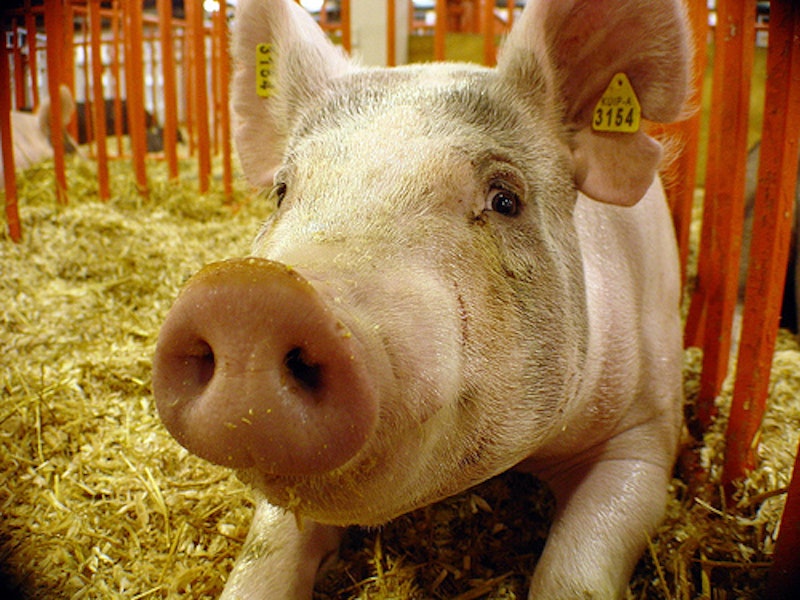Swine flu is something most of us would prefer to forget—an annoying couple of days when the airwaves were saturated with mindless jabbering about an imminent pandemic, with alarming leading questions overlaid atop montages of deserted Mexican squares and Asians wearing face masts. The pandemic never came to pass, and thank god it didn't, because despite all the media coverage, hardly anybody showed any real awareness of where the flu came from.
The popular science magazines managed to pinpoint the proximate cause of the outbreak: a normally benign virus, which spread unnaturally quickly among factory-farmed pigs in the US, according to Wired and Scientific American. The close quarters, weakened immune systems, and globalized nature of factory farmed pigs allowed the virus to mutate and become more virulent, setting the stage for its eventual leap to the human species.
But what has driven the rise of factory farming, and what should the government do about it? The predictable liberal response, fielded by David Sirota at In These Times, was to blame unbridled capitalism—or, in one of many puns, “piggish capitalism.” As he tells it, it was the government's failure to stop mergers and consolidation in the swine industry and to properly inspect farms that caused swine flu's outbreak.
Oddly, though “subsidies” feature prominently in Sirota's crosshairs, he never says what exactly is being subsidized that encourages factory farming. Despite being the first thing on the list, he doesn't seem to really understand what these subsidies are, and he never considers the fact that capitalism generally isn't supposed to involve subsidies.
Others, however, do understand how subsidies encourage factory farming. In 2007, researchers Elanor Starmer and Timothy Wise of Tufts published a paper arguing that farm subsidies for corn and soybeans doled out by the federal government are responsible for, among other things, the explosion in factory farming of pigs. Hog farming, unlike other livestock industries, was not dominated in the U.S. by consolidated factory farms until relatively recently. Farmers used to rely on the cost advantages of being small and diversified; they could feed the pigs corn grown cheaply on their own farm, as well as the husks and other things that only a pig would eat, and in turn use the pig's waste as fertilizer. There was (and still is) little to no added efficiency in raising 20,000 hogs as opposed to 2000.
This has changed in the last few decades, as crop subsidies drive the retail price of livestock feed far below the cost faced by farmers producing it themselves. Farmers would lose money if they raised hogs on their own corn, and so small, diversified operations have all but ceased to exist. Starmer and Wise analyzed the distortion caused by a farm policy reform bill passed in 1996 known as the FAIR Act, and found that it dramatically increased subsidies for corn and soybeans, leaving the hog farming industry almost entirely in the hands of a few large factory-farming firms.
And in fact the 1996 bill was not even the last pro-factory farms bill passed by Congress. Researchers at Iowa State University presented a similar analysis on a different farm bill, passed in 2002, and came to the same conclusion—that farm subsidies were destroying the small, diversified farm in favor of the factory behemoths, dedicated solely to raising and slaughtering pigs.
David Sirota might be forgiven for not finding these academic papers, neither of which have yet been published in any peer-reviewed journal, but there is still no excuse for not making the connection between factory farming and crop subsidies. Just two years earlier, In These Times, the same publication in which he published his recent article and where he works as a senior editor, published an article by David Moberg, which made exactly that argument.
Nor was Sirota right in framing the issue as evil deregulators vs. righteous progressive health inspectors. If indeed crop subsidies were the cause of the swine flu outbreak, Sirota ought to have been lambasting President Obama for his consistent support of the status quo. Though The New York Times breathlessly called his plan to cut farm subsidies “audacious,” many have pointed out how superficial the cuts really are.
Obama no longer has an excuse for not speaking out against these dangerous interventions in the agricultural sector. Reforming the crop subsidies has the backing of a broad coalition of environmentalists (it turns out, the subsidies are ecological weapons of mass destruction), economists, and neocons. Even John McCain, who told The Wall Street Journal while he was campaigning for president that he “doesn't really understand economics,” promised to veto agriculture spending bills (though to honest, he was more talk than action). Vegetarians and foodies like Michael Pollan are against the subsidies because they cheapen animal products and processed foods over other healthier, less subsidized foods. Wired stated bluntly that fast food is “just another name for corn,” and that the subsidies benefit the industry enormously. And the Pew Trusts, who've been plastering the DC Metro with ads in a campaign against the widespread use of antibiotics on livestock animals, ought to realize that factory farming caused by crop subsidies is ultimately responsible for the rise of drug-resistant “superbugs.”
Going up against the American farm lobby is not a safe political bet, but then again Obama promised to be a different kind of politician. If Obama is truly seeking to be an enlightened pragmatist, seeking generally acknowledged political truths with broad, bipartisan constituencies, ending farm subsidies is the perfect place to start.
The Pork Spending We Should Worry About
How farm subsidies caused the swine flu outbreak.

Photo by The Pug Father
